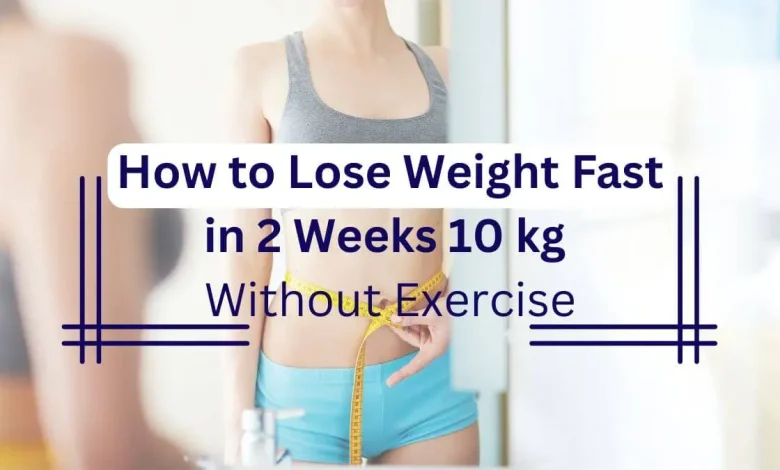Ultimate Guide to Rapid Weight Loss: Shedding 10kg in 2 Weeks Without Exercise

Losing weight fast is a common goal for many individuals. The desire for rapid weight loss is often linked to an upcoming event or milestone and can be achieved through a balanced approach. In this guide, we will discuss How to Lose Weight Fast in 2 Weeks 10 kg Without Exercise.
Read Also: 10 Proven Strategies for Successful Weight Loss
Understanding Weight Loss
To achieve rapid weight loss, it is essential to understand the science behind it. The body operates on a caloric balance, which means that weight is gained when more calories are consumed than burned and lost when the reverse is true. There are several factors that affect weight loss, including genetics, metabolism, and lifestyle habits.
Creating a Calorie Deficit
A calorie deficit is vital to achieving rapid weight loss. This means that you must consume fewer calories than you burn each day. To determine your daily calorie needs, calculate your basal metabolic rate (BMR) and multiply it by your activity level.
Designing a Healthy Meal Plan
To create a healthy meal plan, choose nutrient-dense foods such as fruits, vegetables, lean proteins, and whole grains. Portion control is also important, as well as timing your meals throughout the day. Aim to eat smaller meals more frequently to keep your metabolism active.
The Power of Intermittent Fasting
Intermittent fasting is a popular diet trend involving cycling between eating and fasting periods. There are several methods of intermittent fasting, each with its own benefits. Intermittent fasting has been shown to be effective for weight loss due to its ability to reduce caloric intake and increase metabolic rate.
Supercharging Your Metabolism
To boost your metabolism, incorporate metabolism-boosting foods such as green tea, chili peppers, and ginger. Staying hydrated and getting enough sleep also play a crucial role in maintaining a healthy metabolism.
- 30 Achievable Mental Health Goals to Set in 2025
- List of Foods to Eat With Acid Reflux
- The Healing Elixir: 10 Surprising Benefits of Drinking Hot Water
- The 7-Day Fruit Diet: A Delicious Path to Weight Loss
- How to Get Rid Belly Fat Quickly: Your Ultimate Guide to Quick and Effective Results
Effective Strategies for Portion Control
Using smaller plates and bowls can help control portion sizes. Practicing mindful eating techniques such as slowing down while eating and savoring each bite can also help with portion control.
Managing Hunger and Cravings
Hunger and cravings can be managed through healthy snacking and alternative options. Incorporating protein-rich snacks such as nuts and seeds can help reduce hunger and control cravings.
Incorporating Physical Activity
While exercise is not necessary for rapid weight loss, increasing daily activity can be beneficial. This can include taking the stairs instead of the elevator, walking or biking to work, or incorporating short bursts of exercise throughout the day.
Hydration and Weight Loss
Staying hydrated throughout the day is important for weight loss. Drinking water before meals has been shown to reduce caloric intake, while dehydration can slow down metabolism and make it harder to lose weight.
Utilizing Herbal Teas and Natural Supplements
Herbal teas such as green tea, oolong tea, and peppermint tea can aid in weight loss by boosting metabolism and reducing appetite. Natural supplements such as probiotics and apple cider vinegar have also been shown to support weight loss.
Strategies for Dining Out
Making healthy choices at restaurants can be challenging, but it is possible with a few simple strategies. Look for options that are grilled, roasted, or steamed, and avoid fried foods. Controlling portion sizes can also be done by ordering a half-portion or sharing a meal with a friend.
The Role of Sleep in Weight Loss
The link between sleep and weight is significant, as lack of sleep can disrupt hormones related to hunger and appetite. Getting enough sleep and improving sleep quality can help with weight loss.
Monitoring Progress and Staying Motivated
Setting realistic goals and tracking progress can help to stay motivated. Measuring progress through body measurements or keeping a food diary can help to stay on track and make adjustments when necessary.
Managing Stress for Weight Loss Success
Stress can have a negative impact on weight loss, and finding effective stress-reduction techniques can be crucial. Strategies such as meditation, yoga, and deep breathing can help to control stress and promote weight loss.
Tips for How to Lose Weight Fast in 2 Weeks 10 kg Without Exercise

Transitioning to a long-term healthy lifestyle is crucial for sustaining weight loss. Strategies such as meal planning, staying active, and practicing mindful eating can help to maintain weight loss.
Summary: Key Takeaways How to Lose Weight Fast in 2 Weeks 10 kg Without Exercise
Effective strategies for rapid weight loss include creating a calorie deficit, designing a healthy meal plan, incorporating intermittent fasting, supercharging metabolism, practicing portion control, managing hunger and cravings, incorporating physical activity, staying hydrated, utilizing herbal teas and supplements, strategies for dining out, the role of sleep in weight loss, monitoring progress, managing stress, and sustaining weight loss.
Frequently Asked Questions (FAQs): How to Lose Weight Fast in 2 Weeks 10 kg Without Exercise
Q. Can I really lose 10kg in just 2 weeks?
Ans: It is not recommended to aim for such rapid weight loss. Losing 10kg in just 2 weeks is extremely challenging and may not be sustainable or healthy for your body. It’s important to set realistic and achievable weight loss goals.
Ans: Is it safe to lose weight this quickly?
Ans: Losing weight too quickly can have potential health risks. Rapid weight loss often involves severe calorie restriction, which can lead to nutrient deficiencies, muscle loss, and a slower metabolism. It’s generally safer to aim for a gradual and steady weight loss of 0.5-1kg per week.
Q. Do I need to consult a healthcare professional before starting this plan?
Ans: Consulting a healthcare professional before starting any weight loss plan is advisable, especially if you have underlying health conditions or if you’re considering a drastic and rapid weight loss approach. They can provide personalized guidance and ensure your plan is safe and suitable for you.
Q. Can I combine exercise with this weight loss plan?
Ans: Combining exercise with a weight loss plan is beneficial for overall health and can enhance your weight loss efforts. Regular physical activity helps burn calories, improves cardiovascular health, and supports muscle growth.
Q. Are there any side effects I should be aware of?
Ans: Rapid weight loss methods may have side effects, including fatigue, dizziness, muscle loss, nutritional deficiencies, gallstones, and a slowed metabolism.
Q. What if I don’t reach my weight loss goal in 2 weeks?
Ans: If you don’t reach your weight loss goal in 2 weeks, it’s essential to remain patient and avoid becoming discouraged. Sustainable weight loss takes time, and it’s important to focus on long-term lifestyle changes rather than short-term results.
Q. Can I repeat this plan multiple times?
Ans: It’s not advisable to repeat drastic and rapid weight loss plans multiple times in quick succession. These plans often involve severe calorie restriction, which can be detrimental to your health if prolonged.
Q. Is this weight loss plan suitable for everyone?
Ans: Rapid weight loss plans may not be suitable for everyone. People with certain health conditions, such as diabetes, heart disease, or eating disorders, should consult a healthcare professional before attempting any weight loss program.
Q. How can I avoid weight regain after completing the plan?
Ans: To avoid weight regain after completing a weight loss plan, it’s important to transition into a balanced and sustainable eating pattern. Focus on consuming a variety of nutrient-dense foods in appropriate portions, engage in regular physical activity, and maintain a healthy lifestyle overall.
Q. Are there any alternative methods to consider for rapid weight loss?
Ans: Alternative methods for rapid weight loss may include very low-calorie diets, meal replacements, or intermittent fasting. However, it’s important to approach these methods with caution and consult a healthcare professional before attempting them.
In conclusion, rapid weight loss is possible through a balanced and sustainable approach. By incorporating the strategies outlined in this guide, you can achieve your weight loss goals in just 2 weeks without exercise.
Remember to focus on a healthy lifestyle for long-term success and consult a healthcare professional if necessary.


